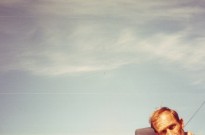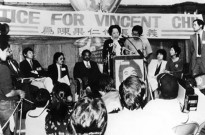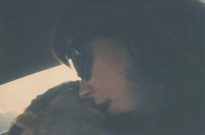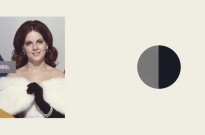Research & Development
Jason Lazarus
T.H.T.K. (Toronto)

July 5 – August 10, 2013
Gallery TPW is pleased to present “Too Hard to Keep,” a site-specific installation by Chicago artist Jason Lazarus, drawn from a growing archive of photographs donated by owners who find them too painful to live with any longer. Initiated in 2010, “Too Hard to Keep” (T.H.T.K.) is a repository for photographs, photo-objects, and digital files that are too difficult for their owners to hold onto, but which are too meaningful to destroy.
Gallery TPW is pleased to present “Too Hard to Keep,” a site-specific installation by Chicago artist Jason Lazarus, drawn from a growing archive of photographs donated by owners who find them too painful to live with any longer. Initiated in 2010, “Too Hard to Keep” (T.H.T.K.) is a repository for photographs, photo-objects, and digital files that are too difficult for their owners to hold onto, but which are too meaningful to destroy.
No Looking After the Internet

Discussion
Monday, June 10, 2013, 7:30 pm
No Looking After the Internet is a monthly “looking group” that invites participants to look at a photograph (or series of photographs) they are unfamiliar with, and “read” the image out-loud together. The June meeting of No Looking After the Internet will respond to Doug Ischar’s current solo exhibitions at Gallery 44 and Vtape, examining desire as a force that often exceeds the usual codes of photographic representation. Co-facilitated by artist and curator Jean-Paul Kelly.
recent future
Residency with Zoja Smutny and Guntar Kravis
Wanting Images:
On looking at
“difficult photographs”

Posted June 4, 2013
Writer and scholar Sara Matthews contributes a series of blog posts to TPW R&D Online. Entitled Wanting Images, the series explores the relation between art, pedagogy and desire. Taking the form of a conversation with various images, visual projects and curatorial strategies, the intent is to explore the notion of what constitutes a pedagogical encounter in looking and to consider the methodological dilemmas raised by such provocations.
Writer and scholar Sara Matthews contributes a series of blog posts to TPW R&D Online. Entitled Wanting Images, the series explores the relation between art, pedagogy and desire. Taking the form of a conversation with various images, visual projects and curatorial strategies, the intent is to explore the notion of what constitutes a pedagogical encounter in looking and to consider the methodological dilemmas raised by such provocations.
Who Killed Vincent Chin?

Who Killed Vincent Chin?
A Screening and Talk With Christine Choy and Richard Fung
Thursday June 6th, 2013, 6:30 pm
Gendai invites you to this first "module" in the Model Minority series that takes an intersectional approach to analyze the practices that construct hierarchies, conflict and power struggles in the terrain of multiculturalism and cultural diversity in North America.
A Screening and Talk With Christine Choy and Richard Fung
Thursday June 6th, 2013, 6:30 pm
Gendai invites you to this first "module" in the Model Minority series that takes an intersectional approach to analyze the practices that construct hierarchies, conflict and power struggles in the terrain of multiculturalism and cultural diversity in North America.
If I Can’t Dance Toronto
Wanting Images:
Sleeping Soldiers

Posted May 16, 2013
Writer and scholar Sara Matthews contributes a series of blog posts to TPW R&D Online. Entitled Wanting Images, the series explores the relation between art, pedagogy and desire. Taking the form of a conversation with various images, visual projects and curatorial strategies, the intent is to explore the notion of what constitutes a pedagogical encounter in looking and to consider the methodological dilemmas raised by such provocations.
Writer and scholar Sara Matthews contributes a series of blog posts to TPW R&D Online. Entitled Wanting Images, the series explores the relation between art, pedagogy and desire. Taking the form of a conversation with various images, visual projects and curatorial strategies, the intent is to explore the notion of what constitutes a pedagogical encounter in looking and to consider the methodological dilemmas raised by such provocations.











